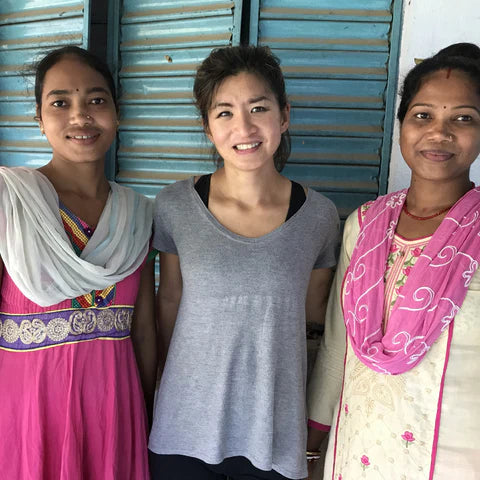Empowering Women: The Journey of Cruelty-Free Organic Peace Silk Sleepwear

Image: Founder, Lily with master weaver Hira and trainee
On this Women's International Day, we celebrate the incredible journey of empowerment that begins from the farm and extends to the world of fashion. At Ethical Kind we are proud to offer cruelty-free organic peace silk sleepwear that not only envelops you in luxurious comfort but also uplifts women across the globe.
Ethical Kind is inspired by a personal journey founded by Lily Chong in 2019. Lily was raised by her grandparents and single mother, who worked as a garment worker with a family heritage in silk farming in South China. At a young age, Lily saw how the fashion industry's exploitation impacted the people and the planet and how rural communities continued to face education and social inequalities caused by poverty, cultural norms, and practices, particularly as girls. She decided to use business as a force for good, to empower women and uplift rural communities at all levels in the supply chain.
Introducing women to sustainability and ethical silk production, so-called 'organic peace silk', gives women a shopping alternative to conventional silk that is better for the people and planet. Organic peace silk is a more humane type of sericulture that promotes regenerative farming, allowing silkworms to complete their natural life cycle into silk moths. With women representing 80% of all silk purchasing decisions today and occupying over 60 % of women's workforce in rural sericulture (silk farming) activities in India, organic peace silk is a fabric for empowered women.
Women in Sericulture
Sericulture (silk production) is a village-based industry that employs both skilled and unskilled labour. Women work in the field, silkworm rearing, harvesting, silk reeling, weaving, and garment-making. Women are preferred because of their maternal instincts and industrious nature, from their loving care for rearing silkworms to their fingers' dexterity in getting the fine filaments from the cocoons, reeling silk yarn, and weaving fabric. Women have shown their mettle in all these activities and performed their tasks skillfully.
1. Empowering income generation

Image: Hira, started as an apprentice at age 16, she is now the master weaver and teachers others the skill
Due to limited land availability and agricultural cash returns confined to one or two seasons in the year, villages have low periods of extreme income generation. To avoid poverty, many families would migrate to cities and live in shanty huts for work.
Sericulture has provided women with supplementary income to support their families. By setting up businesses in remote areas for organic peace silk in Jharkhand, India, the operation has allowed women to work from home and provide an economic perspective without moving to cities.
Our operations ensures all women and men are paid equally and fairly as per The International Labour Organization (ILO) guidelines, which is audited by (GOTS) Global Organic Textile Standard.
2. Empowering Decision Making

Image: Women are promoted to managerial positions and receive equal pay as men.
In rural society, women typically have reduced transportation and sales roles, which limit their direct access to profits and high-value functions. Also, poor access to education and women's well-being services undermines women farmers and their families.
Our organic silk farm operation encourages women to take an active role in the community, with the majority of higher post positions given to women in the company to promote gender equality and respect. Free training for aspiring farmers, weavers and designers is available in the region. Separate toilet facilities are also available for women at each facility.
3. Knowledge Empowerment
Image: Children at local village PPP school near the silk farms
While women may be responsible for most silk production, women have limited access to technical background.
Our give-back initiative supports the silk farm's local village school in the Private-Public Partnership (PPP) model. The children of employees receive a modern quality education at no cost to transform future technology projects and developments.
Conscious Consumerism
It's reassuring to learn many women workers now have a comfortable lifestyle, and their children are attending local schools. The women in the group can adapt their new professional skills allowing for social and economic self-dependency.
From the serene silk farms where our silk is ethically sourced to the skilled artisans who craft each piece with love and care, every step of our production process is a testament to the power of women supporting women. By choosing our sleepwear, you are not just investing in a beautiful garment; you are investing in a chain of empowerment that reaches far and wide.
Our commitment to cruelty-free practices and organic materials not only ensures the well-being of the silkworms but also promotes sustainable and ethical fashion. We believe that true beauty shines brightest when it is rooted in compassion and respect for all living beings.
This Women's International Day, join us in celebrating the strength, resilience, and creativity of women worldwide. Together, we can create a more peaceful and harmonious world, one silk thread at a time.
Empower yourself. Empower women. Empower the world with cruelty-free organic peace silk sleepwear.

